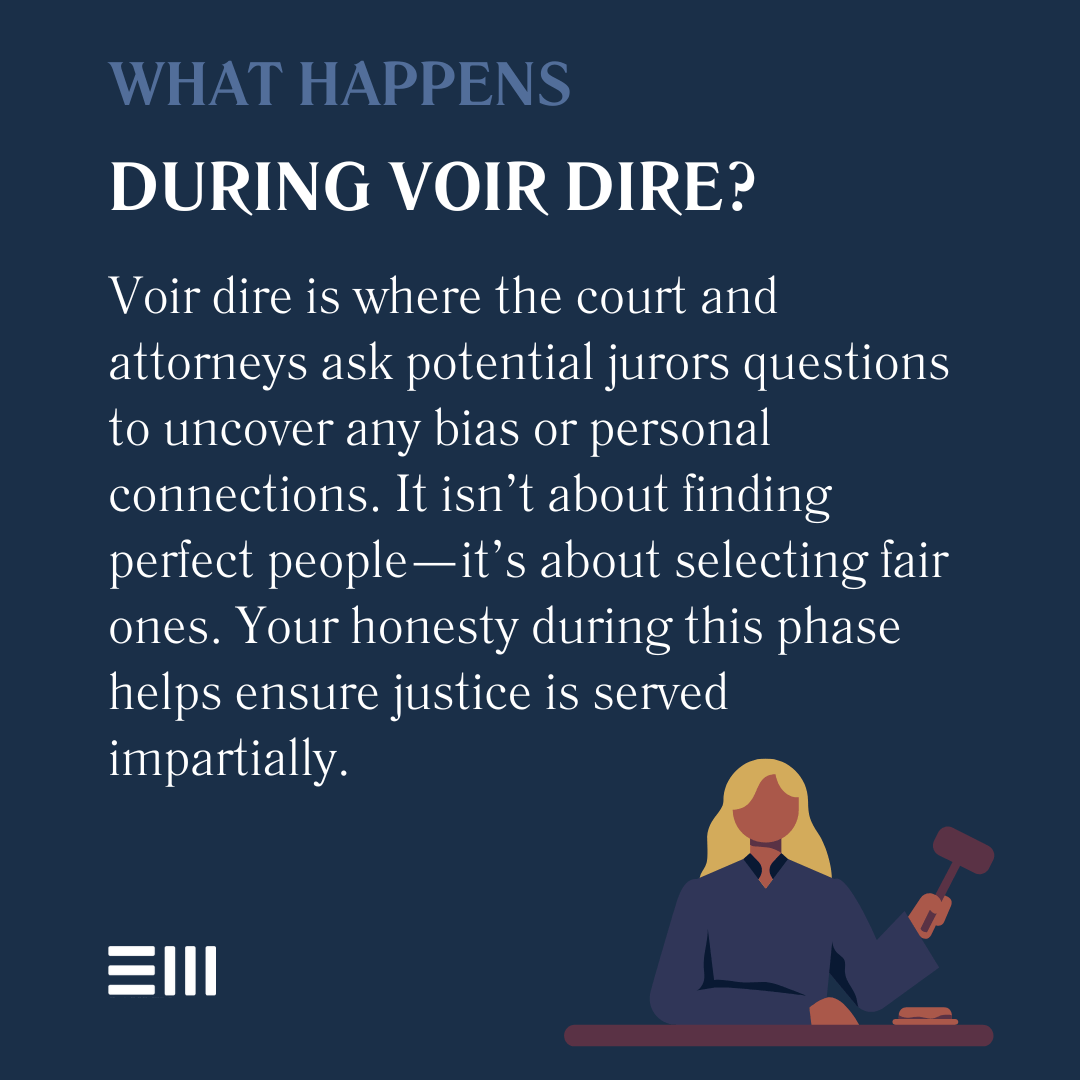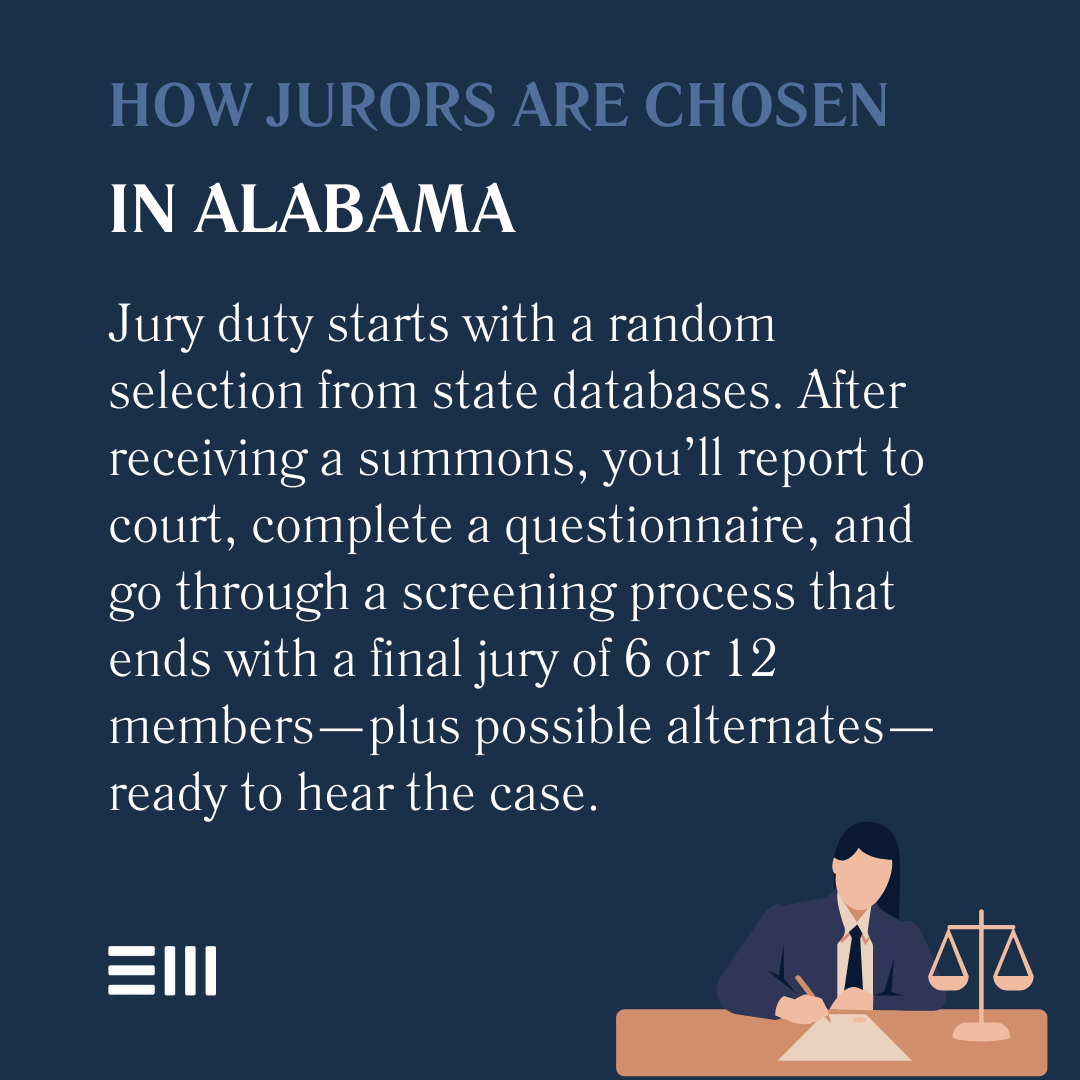For many Alabamians, finding that official jury summons in the mailbox can trigger a mix of curiosity and apprehension. The selection process that determines who sits in judgment combines centuries-old legal traditions with modern considerations of fairness and impartiality.
Understanding what happens after receiving that summons can transform an intimidating civic obligation into a meaningful participation in our justice system.
The Jury Selection Process in Alabama
The jury selection process in Alabama follows a methodical sequence designed to create an impartial panel of your peers. This process ensures that both prosecution and defense have input on who ultimately decides the case outcome.
The selection begins with a random draw from voter registration lists, driver's license records, and state ID databases. From there, potential jurors face a multi-step screening process before a final jury is seated.
Receiving a Jury Summons
A jury summons typically arrives by mail several weeks before the required court date. This official document contains crucial information you'll need to prepare for your civic duty.
Alabama law recognizes certain automatic exemptions from jury service, including:
- Adults over 65 years of age;
- Primary caregivers for children under 7;
- Full-time students;
- Military personnel on active duty; and
- Individuals with documented medical conditions.
Even without an exemption, you may request a deferral to serve at a later date if the timing creates significant hardship. Courts take jury duty seriously, and failure to respond to a summons can result in fines or other penalties.
Jury Pool Assembly
On your assigned date, you'll join other potential jurors in a designated waiting area at the courthouse. Court personnel will verify your identity, provide an orientation, and explain the selection process that follows.
During this initial assembly, you'll complete a basic questionnaire about your background, learn about the selection process, and receive a juror number for identification. This waiting period can last several hours, so consider bringing reading materials or other quiet activities.
Voir Dire Process
The voir dire phase represents the heart of jury selection. This French term, meaning "to speak the truth," describes the questioning of potential jurors to determine their suitability for service.
During voir dire, you may be asked about:
- Your knowledge of the case or parties involved;
- Personal experiences that might affect your impartiality;
- Relationships with law enforcement or witnesses;
- Attitudes toward relevant legal principles; and
- Your ability to follow the law as instructed by the judge.
Answer all questions honestly, even if some feel personal. The goal isn't finding jurors with no opinions—it's finding jurors who can set aside preconceptions and judge the case fairly based on evidence.
Peremptory Challenges and Challenges for Cause
Attorneys have two mechanisms for removing potential jurors during selection: challenges for cause and peremptory challenges.
Challenges for cause are unlimited and require the attorney to demonstrate a specific reason why a juror cannot be fair and impartial, such as personal relationships with parties in the case or expressed bias.
Peremptory challenges allow attorneys to remove a limited number of jurors without stating a reason, though these cannot be used to discriminate based on race, gender, or other protected characteristics. The number of peremptory challenges varies based on the type of case, ranging from 3-12 per side, depending on case severity.
Final Jury Selection and Alternates
The final jury typically consists of 12 members for felony trials and 6 members for misdemeanor or civil trials in Alabama. The court may also select alternate jurors who attend the entire trial but only participate in deliberations if a regular juror becomes unable to serve.
Once selected, the judge will administer the juror's oath, provide preliminary instructions about the case, explain courtroom procedures, and advise on prohibited activities during the trial. This marks your transition from selection to active participation in the judicial process.
Frequently Asked Questions About Jury Selection in Alabama
Understanding the jury selection process helps demystify one of our most important civic duties.
The following questions address common concerns that many potential jurors have when facing this responsibility.
How Long Does Jury Selection Take?
Jury selection typically takes between several hours to multiple days, depending on case complexity. Simple misdemeanor trials might complete selection in a single morning, while high-profile cases can require several days to assemble an impartial jury.
What Should I Wear to Jury Selection?
Appropriate attire for jury duty reflects the serious nature of court proceedings. Business casual clothing—such as slacks, collared shirts, modest dresses, or skirts—shows respect for the process without requiring formal business attire.
Can I Use My Phone During Jury Selection?
Most Alabama courthouses restrict electronic device usage in courtrooms but allow them in designated waiting areas. During actual selection questioning, phones must be completely powered off or left outside the courtroom.
What if I Know Someone Involved in the Case?
Immediately disclose any connections to the case during voir dire questioning. Knowing a participant doesn't automatically disqualify you, but concealing such information could result in mistrial or other serious consequences.
Can My Employer Fire Me for Serving on a Jury?
Alabama law prohibits employers from firing, threatening, intimidating, or coercing employees regarding jury service. Employers cannot require employees to use vacation or sick leave while serving on a jury. The court provides a small daily stipend for jury service, though this typically doesn't match regular wages.
Let Justice Roll With Baxley Maniscalco
The jury selection process represents just one aspect of Alabama's complex legal system. Whether you're facing a personal injury claim, criminal charges, or other legal challenges, having experienced guidance can make all the difference in protecting your rights and interests.
At Baxley Maniscalco, our Alabama attorneys bring decades of combined experience navigating local courts and procedures. We provide personalized representation tailored to your specific situation, helping you understand not just what's happening, but why it matters to your case.
Don't face the legal system alone.
Contact Baxley Maniscalco today for a confidential consultation with one of our dedicated legal professionals. Our team is ready to answer your questions and help you determine the best path forward.


